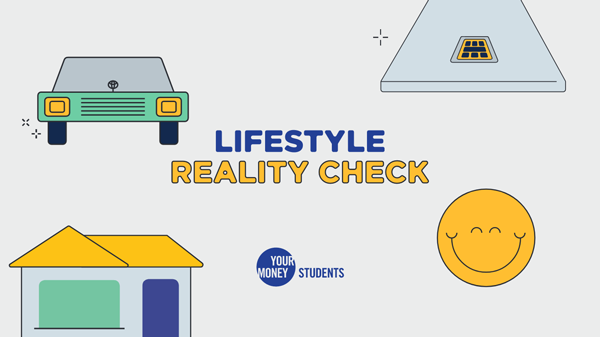A budget is a financial statement or plan that tells you about Your Money: where it comes from and how it's spent. Whether it's for buying tickets to next month's concert or paying university tuition, a budget allows you to plan your finances according to your current situation and for the future.
Try our new, interactive Lifestyle Reality Check budgeting web app!

How to budget in three steps
Step One: Figure out your income
Income is usually the money you receive regularly when working at a job. The amount you're paid every paycheque makes up your income. But it can also come in other forms such as allowance from parents, interest from a savings account and monetary gifts, like on birthdays or holidays. Adding up all these sources according to a monthly or yearly intake will let you identify what your income is.
Step Two: Figure out your expenses
Expenses are the opposite of income. An expense is anything you spend your money on, and can be either fixed or variable:
- Fixed expenses: Those bills you have to pay and that tend to be the same amount month-to-month or year-to-year. They include: rent, gym membership fees, tuition payments, car payments, and cell phone bills, for example.
- Variable expenses: The amounts that vary from month to month and over which you have some control. They include: food, clothing, transportation, long distance telephone, vacations, gifts and contributions, personal care, recreation, and money for other miscellaneous purchases.
As in step one, you can figure out your expenses by adding up these sources. Save your receipts, use bank or credit card statements and look at bills and other documents to find the sum of what you spend monthly or yearly.
Step Three: Evaluate your budget
Now some simple math: Subtract your expenses from your total income to see what money you have left. When you total your expenses, they should be equal to or less than your income.
If the expenses exceed income and you come up with a negative figure, you're in trouble. Spending in certain areas will have to be reduced to keep you financially healthy. Cut back wherever you can to ensure that your expenses are less than your income. For example, look at variable expenses that may be reduced or postponed until a later date.
If you do happen to have money left over, that's great! Put this into a savings account or other investment. That way, you can save up to meet your goals, like attending college or university, buying a new video game console or that purse you've had your eye on for way too long. Keep your budget up to date as your income and goals change.